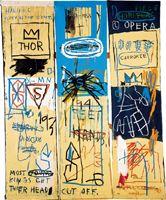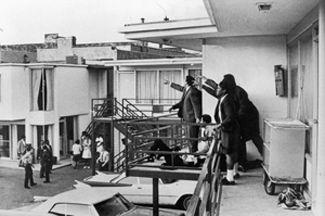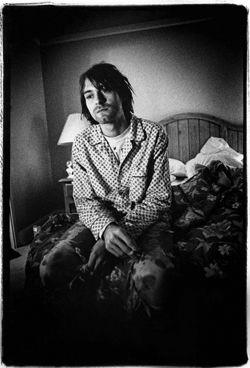Decoded (41 page)
Authors: Jay-Z
Tags: #Rap & Hip Hop, #Rap musicians, #Rap musicians - United States, #Cultural Heritage, #Jay-Z, #Entertainment & Performing Arts, #United States, #Music, #Rich & Famous, #Biography & Autobiography, #Genres & Styles, #Composers & Musicians, #Biography

8.
Sprewells are custom rims that have an internal disk that spins when the car stops, named after Latrell Sprewell, who started selling them in his custom shop. Fun for kids, but for grown-ups, a sign that you might be trying too hard.

9.
A satisfying list of ignorant words—childish and adult at the same time, like a rapper with Tourette’s.
10.
A bilingual list of ignorant words, just to make sure everyone’s included.
11.
When I say that rappers are actors, I mean it in two ways: First, a lot of them are pretending to be something they’re not outside the booth; second, it also means that even rappers who are being real often use a core reality as the basis for a great fantasy, the way a great method actor like DeNiro does.
12.
They’re standing in the “mirror backwards” because they can’t face themselves. No matter how convincing you are to the rest of the world, you still know the truth, and in a private moment it shames you enough to turn away from your own reflection. I bring back the idea a few lines later, when I say that what they’re saying in their rhymes is as backward as their posture in the mirror.
13.
This Marvin Gaye reference also makes the point that even an honest rapper has the liberty to make things up, because it’s entertainment.
14.
The concept of this song was a license to go completely over the top. But there’s a serious point in the end.
15.
Imus called the Rutgers women’s basketball team a “bunch of nappy-headed hoes,” and the debate over his dismissal somehow got turned into a debate about the language used in rap.
16.
We give violent movies a pass but come down hard on a rapper like Scarface, who is ultimately a storyteller just like Brian de Palma. And neither of them is responsible for the poverty and violence that really do shape people’s lives—not to mention their individual choices.
MOST KINGS
1.
This is no shot at Big or Pac. The truth is that you can’t compare us; Big only did two albums before he was killed, and Pac was still going through metamorphosis; who knows where he would’ve ended up. So when people make the comparison—as they always do—they’re comparing my work not just with the work of Big and Pac, but with what they could’ve been—should’ve been—and what their lives and deaths represented to the entire culture. Their shadows still loom over all of us who were their peers.

2.
I wanted to conjure an image here: someone kneeling, first to accept the honor of being knighted, and then being beheaded with the same sword, the posture of honor transformed to one of execution.
3.
I wrote this before MJ died, and his death only proves my point: When he was alive, the King of Pop, people were tireless in taking him down, accepting as truth every accusation people made against him, assuming the worst until they drove him away. When he died, suddenly he was beloved again—people realized that the charges against him might really have been bogus, and that the skin lightening was really caused by a disease, and that his weirdness was part of his artistry. But when he was alive and on top, they couldn’t wait to bring him down. (In my opinion sharing sleeping quarters with other people’s kids is inappropriate, to keep it real.)

4.
Jesus and Caesar were both killed by people close to them, traitors.
5.
A reference to KRS-One and Just-Ice’s eighties classic “Moshitup.”
Buddy-bye-bye!
6.
Bobby then was a young star when he was known for his hit record “Every Little Step”; Bobby now is better known for the hit reality series,
Being Bobby Brown,
a cautionary tale about how it can all slip away.
7.
Shout-out to Alfred, Lord Tennyson: “’Tis better to have loved and lost, than to never have loved at all.”
8.
Here I’m playing with “king” and King—Martin Luther King, who was assassinated on the balcony of the Lorraine Motel.
9.
Malcolm was distracted by screams before he was shot—a man shouted, “Nigger get your hands outta my pockets,” and then the fatal shots rang out.
10.
Kurt Cobain OD’d on heroin before committing suicide, but he also OD’d on fame. Cobain was like Basquiat: They both wanted to be famous, and were brilliant enough to make it happen. But then what? Drug addicts kill themselves trying to get that feeling they got from their first high, looking for an experience they’ll never get again. In his suicide note, Cobain asked himself, “Why don’t you just enjoy it?” and then answered, “I don’t know!” It’s amazing how much of a mindfuck success can be.

11.
You have to lift the drawbridge of your life once you get famous to keep outsiders outside—whether they’re new hangers-on just trying to exploit you, or, like in the streets, they might literally wake you up with a gun to your nose, trying to take your shit. But the “inner sanctum” isn’t just your physical home, it’s the inner chamber of your life and identity, the place where you protect your essential self. If invaders break in there, you’re finished.
SUCCESS / FEATURING NAS
1.
This is a reference to Eminem’s “I’m Back”:
What do I think of success? It sucks too much press I’m stressed.
2.
This refers to old friends on the street and in the rap game who still think of me as their sidekick or protégé, or the little nigga they put on. At one point that’s maybe who I was—but then my nuts dropped and I became my own man. And that happened a long time ago.
3.
Another reference to finishing breakfast, as in “Public Service Announcement,” which connects with the “appetite for destruction” and “small fry” in the next line.

4.
I went to such a visceral image here because I was trying to make a point: In America—and in hip-hop—success is supposed to be about accumulation and consumption. But the finest meal ends up as shit, which is a great metaphor for the fact that consumption’s flip side is decay and waste, and what’s left behind is emptiness. Empty apartments, empty stomach, unused objects. Which isn’t to say I don’t like buying things and eating nice meals as much as the next person (okay, maybe even more), but success has to mean something beyond that.
RENEGADE / FEATURING EMINEM
1.
Eminem produced this song and came up with the concept, which was to attack the mistaken perceptions people had of him. By the time I got my hands on it, he’d already recorded his verse, which is absolutely fucking brilliant, in his lyrical concepts and rhyme schemes—
go to war with the Mormons, take a bath with the Catholics / in holy water it’s no wonder they try to hold me under longer—
and in his ridiculous flow
—now I’m debated disputed hated and viewed in America / as a motherfuckin drug addict, like you didn’t experiment.
“Renegade” appeared on the
Blueprint
album, which I intended to be spare and personal and soulful; Em’s verses here are the only guest appearance on the album.
2.
This is directed at critics who only listen to the songs that fulfill their preconceived expectations—the “bling bling” in the background summarizes their usual complaint about my music.
3.
This is one of the things that makes me—and all serious rappers—renegades: When we report the news, it doesn’t sound the same as when you hear it from CNN. Most of us come from communities where people were just supposed to stay in their corners quietly, live and die without disturbing the master narrative of American society. Simply speaking our truths, which flew in the face of the American myth, made us rebels.
4.
The image of niggas “crouched over” is mean to show the other side of the usual street story—what happens when shit goes bad, the gun gets dropped, and you’re the one on your knees.
5.
Again, I’m talking about the flip side of the “Money, Cash, Hoes” type songs. Sex can knock you up and knock you down.
Other books
Nature of Jade by Deb Caletti
A Time For Ryda by Stern, Phil
Tiger Lillie by Lisa Samson
Flirting Under a Full Moon by Ashlyn Chase
Moon Awakening by Lucy Monroe
Close by Martina Cole
Wild Spring Plant Foods: The Foxfire Americana Library (7) by Edited by Foxfire Students
A Birthright of Blood (The Dragon War, Book 2) by Arenson, Daniel
Mystic Hearts by Cait Jarrod
Regali (A Walker Saga) by Jaymin Eve
